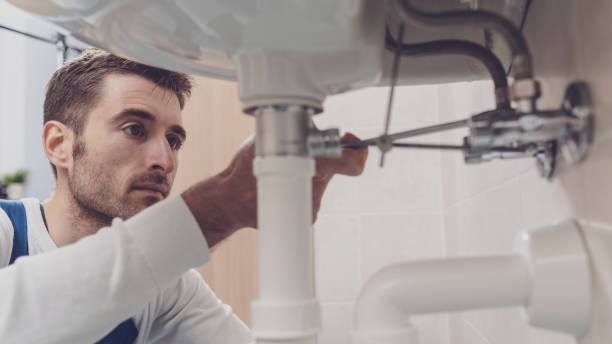Maintaining your home’s plumbing system is essential to ensure a safe and efficient household. By taking proactive steps, you can prevent costly repairs, conserve water, and extend the life of your pipes and fixtures. Here’s how you can keep your plumbing in excellent condition.

Understanding Your Plumbing System
Your plumbing system is a network of pipes, fixtures, and appliances designed to deliver clean water and remove wastewater. It includes supply lines, drains, and plumbing fixtures like sinks, toilets, and showers. To properly maintain this system, it helps to know the basic function of its components and be aware of where key controls, like the main shut-off valve, are located.
Key Components to Be Aware Of:
- Supply Lines – These bring fresh water into your home.
- Drainage System – Removes wastewater safely.
- Water Heater – Supplies hot water for your household needs.
Understanding how the pieces work together will make it easier to spot issues before they become significant problems.
Routine Maintenance Tips Plumbing
Proper maintenance ensures that your system operates smoothly. Follow these tips to avoid unnecessary plumbing issues:
Inspect for Leaks Plumbing
Leaks are the most common plumbing problem. Check under sinks, around toilets, and near appliances for dripping water or moisture. Even small leaks can waste water and lead to higher utility bills.
Clean Drains Regularly
Avoid clogged drains by cleaning them regularly. Use a mixture of hot water, baking soda, and vinegar to clear minor blockages. For tougher clogs, turn to a drain snake or professional assistance instead of harmful chemical cleaners.
Keep Your Water Pressure in Check
Excess water pressure can damage pipes. Invest in a pressure gauge to monitor your home’s water pressure. Ideally, it should fall between 40-60 psi. High pressure may require installing a pressure-reducing valve.
Flush Your Water Heater
Mineral build-up can reduce water heater efficiency. Empty it annually to flush out sediment. If you have an electric tankless water heater in Utah, consult the manufacturer’s guidelines for maintenance specific to your unit.
Preventing Common Plumbing Issues
Aside from regular maintenance, some preventive habits can save you from facing emergencies down the line.
Stop Clogs at Their Source
Be mindful of what you allow down your drains. Grease, oil, coffee grounds, and non-flushable items like wipes can quickly cause blockages. Instead, dispose of these in the trash.
Winterize Your Pipes
Pipes are vulnerable to freezing temperatures in winter. Insulate exposed pipes, especially in unheated areas like basements or garages. Allow faucets to drip on extremely cold days to keep water moving and prevent freezing.
Avoid DIY Mistakes
While it’s tempting to tackle plumbing repairs yourself, certain problems need professional handling. Over-tightening fittings, for instance, can crack pipes and lead to further damage. When in doubt, hire a licensed plumber to get the job done correctly.
Recognizing Warning Signs of Plumbing Problems
Identifying issues early can save you significant time and money. Keep an eye out for:
- Decreased water pressure
- Unusual noises coming from pipes
- Slow drains or frequent backups
- Discolored or foul-smelling water
These signs often point to underlying problems that require immediate attention.
Replacing Aging Fixtures and Pipes
Old pipes and fixtures can corrode or deteriorate, leading to leaks and water quality issues. If your plumbing system is over 20 years old, consider having it inspected for potential upgrades. Modern fixtures can improve water efficiency and reduce overall use, making them a worthwhile investment over time.
The Benefits of Proactive Plumbing Care
Taking care of your plumbing system keeps your home running smoothly and protects your family from water-related hazards. Regular maintenance helps you avoid costly repairs caused by burst pipes, persistent leaks, or major clogs. You’ll also conserve water and maintain the efficiency of critical appliances, like your water heater, for many years.
By following these simple steps and paying attention to necessary maintenance, you’ll keep your pipes and fixtures in excellent condition. Whether you’re addressing small problems like a dripping faucet or taking on larger projects like upgrading to an electric tankless water heater, staying proactive is key. Healthy plumbing ensures your home stays functional and stress-free for years to come.

